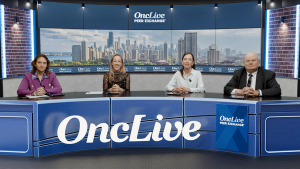
Using the same high-risk patient scenario, the discussion turns to practical strategies for sequencing adjuvant endocrine therapy, ovarian function suppression, and CDK4/6 inhibition.

Your AI-Trained Oncology Knowledge Connection!


Kelly E. McCann, MD, PhD, is an assistant professor and breast medical oncologist at UCLA.

Using the same high-risk patient scenario, the discussion turns to practical strategies for sequencing adjuvant endocrine therapy, ovarian function suppression, and CDK4/6 inhibition.

A premenopausal patient with stage III, node-positive HR-positive, HER2-negative breast cancer is presented to illustrate real-world risk stratification.

Long-term follow-up from the monarchE and NATALEE trials continues to influence treatment decisions in HR-positive, HER2-negative early breast cancer.

Erica Mayer, MD, and Kelly McCann, MD, outline how clinicians define high-risk hormone receptor–positive, HER2-negative early breast cancer in contemporary practice.

Panelists discuss how innovative HER2-targeted strategies and precision approaches will define the next era of breast cancer therapy.

Panelists discuss how new trial results from ASCENT-03 and TROPION-Breast02 are shaping next-generation TNBC therapies.

Panelists discuss how molecular characterization and novel agents are redefining the management of TNBC.

Panelists discuss how HER2-low and HER3-directed therapies are expanding precision treatment opportunities in metastatic breast cancer.

Panelists discuss how newer HER2-targeted therapies show promise for CNS disease control and broader metastatic management.

Panelists discuss how thoughtful sequencing of HER2-targeted agents maximizes benefit and extends survival in metastatic settings.

Panelists discuss how evolving first-line HER2-targeted combinations are improving outcomes and redefining standards in metastatic breast cancer..

Panelists discuss how ADCs are revolutionizing HER2-targeted therapy through precision delivery and improved tolerability across patient subgroups.

Panelists discuss how new trial data are optimizing early-stage HER2-positive breast cancer treatment through refined, evidence-based regimens.

Panelists discuss how the evolution of HER2 testing and classification has redefined treatment strategies and expanded therapeutic opportunities in breast cancer.

Kelly E. McCann, MD, PhD, discusses findings from the VIKTORIA-1 trial of gedatolisib-based regimens in hormone receptor–positive advanced breast cancer.

Kelly McCann, MD, PhD, discusses the relevance of patient preferences during treatment decision-making for patients with HER2-positive breast cancer.

Panelists discuss how the field has made exciting strides, with oral selective estrogen receptor degraders (SERDs) likely moving into early-stage disease and the need for alternative antibody-drug conjugate (ADC) payloads beyond topoisomerase I inhibitors to overcome resistance mechanisms.

Panelists discuss how HER2 testing challenges for identifying HER2-low and -ultralow expression require coordination with pathologists and may involve

Kelly E. McCann, MD, PhD, details the current standard of care and novel approaches for the treatment of ER-positive, HER2-negative advanced breast cancer.

Panelists discuss how they approach sequencing decisions for patients with hormone receptor–positive, HER2- low/ultralow disease, emphasizing selective use of trastuzumab deruxtecan in first-line chemotherapy settings while considering quality-of-life factors.

Panelists discuss how subgroup analyses from DESTINY-Breast06 show trastuzumab deruxtecan benefits across different mutation groups, with particularly strong responses in patients with BRCA1/2-mutated disease due to the topoisomerase I inhibitor payload.

Panelists discuss how treatment options for HER2-low and HER2-ultralow metastatic breast cancer include trastuzumab deruxtecan (T-DXd) and sacituzumab govitecan, with sequencing becoming a key consideration.

Panelists discuss how to manage toxicities associated with datopotamab deruxtecan, particularly ocular toxicity and stomatitis, using prophylactic measures such as steroid mouthwash and eye drops.

Panelists discuss how datopotamab deruxtecan from the TROPHY-PD-01 trial compares with sacituzumab govitecan, highlighting different toxicity profiles and the challenge of sequencing multiple antibody-drug conjugates (ADCs) with the same TROP2 payload.

Panelists discuss how the TROPiCS-02 trial established sacituzumab govitecan for hormone receptor–positive, HER2-negative metastatic breast cancer and how it influences sequencing decisions with other antibody-drug conjugates (ADCs) such as trastuzumab deruxtecan.

Panelists discuss how they decide when to transition from endocrine-based therapies to antibody-drug conjugates, considering factors such as endocrine sensitivity, disease burden, and pace of progression.

Panelists discuss how to approach decision-making among PI3K/AKT pathway inhibitors (capivasertib, alpelisib, everolimus) based on mutation status, toxicity profiles, and dosing schedules in the second-line setting.

Kelly McCann, MD, PhD, discusses the need to reach consensus on the potential role of vepdegestrant for ER-positive, HER2-negative advanced breast cancer.

Panelists discuss how upcoming oral selective estrogen receptor degraders (SERDs; eg, camasertinib, imlunestrant, and giredestrant) are showing efficacy primarily in populations with ESR1 mutations and are all well-tolerated oral agents that will likely receive approvals.

Panelists discuss how elacestrant from the EMERALD trial is being incorporated into practice based on ESR1 mutation status and duration of prior CDK4/6 inhibitor therapy, with combination approaches being explored in the ELEVATE trial.

Published: July 1st 2024 | Updated:

Published: June 23rd 2025 | Updated:

Published: August 6th 2024 | Updated:

Published: July 8th 2024 | Updated:

Published: May 26th 2025 | Updated:

Published: June 25th 2024 | Updated: